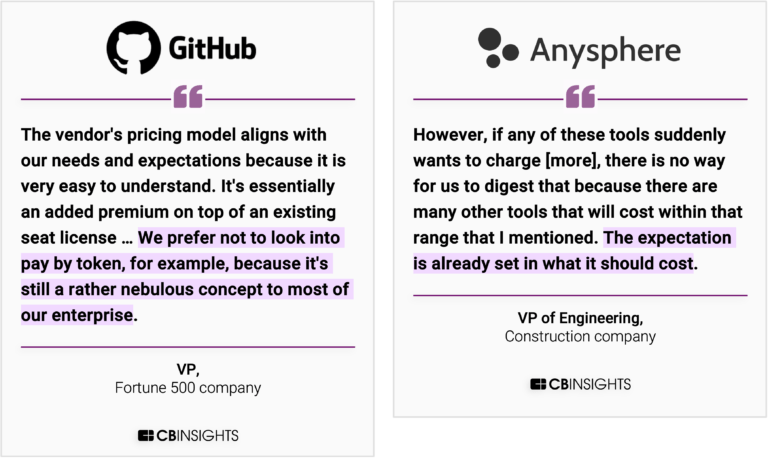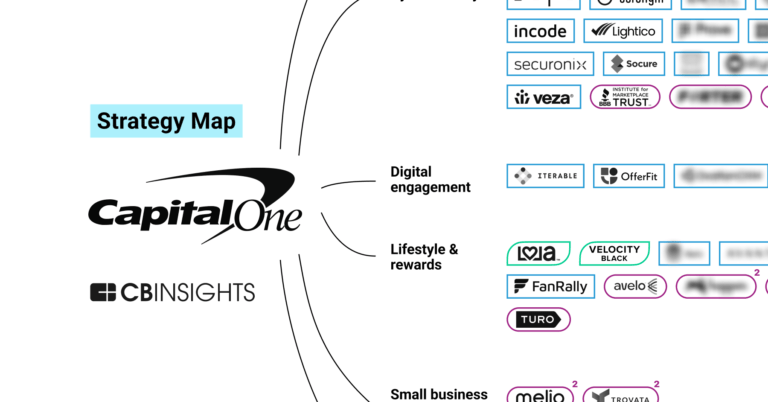
Harness
Founded Year
2017Stage
Debt - III | AliveTotal Raised
$575.35MLast Raised
$150M | 2 yrs agoRevenue
$0000Mosaic Score The Mosaic Score is an algorithm that measures the overall financial health and market potential of private companies.
-27 points in the past 30 days
About Harness
Harness provides Artificial Intelligence (AI) software delivery platforms, focusing on DevOps and software engineering tools. The company offers products related to software delivery processes, including continuous integration, continuous delivery, feature management, infrastructure management, and chaos engineering. Harness serves sectors that require software development and deployment solutions. It was founded in 2017 and is based in San Francisco, California.
Loading...
ESPs containing Harness
The ESP matrix leverages data and analyst insight to identify and rank leading companies in a given technology landscape.
The coding AI agents & copilots market consists of AI-powered solutions that help software developers write, fix, test, and maintain code. These tools offer features like intelligent code completion, natural language code generation, automated testing, code review, debugging assistance, and technical debt management. Many solutions integrate directly with popular IDEs and development environments,…
Harness named as Highflier among 15 other companies, including Augment Code, Replit, and Cognition.
Loading...
Research containing Harness
Get data-driven expert analysis from the CB Insights Intelligence Unit.
CB Insights Intelligence Analysts have mentioned Harness in 2 CB Insights research briefs, most recently on Aug 28, 2025.

Expert Collections containing Harness
Expert Collections are analyst-curated lists that highlight the companies you need to know in the most important technology spaces.
Harness is included in 7 Expert Collections, including Unicorns- Billion Dollar Startups.
Unicorns- Billion Dollar Startups
1,309 items
Tech IPO Pipeline
282 items
Track and capture company information and workflow.
Future Unicorns 2019
50 items
AI 100 (All Winners 2018-2025)
200 items
Winners of CB Insights' 5th annual AI 100, a list of the 100 most promising private AI companies in the world.
Generative AI
2,951 items
Companies working on generative AI applications and infrastructure.
Artificial Intelligence (AI)
20,894 items
Harness Patents
Harness has filed 14 patents.
The 3 most popular patent topics include:
- cloud computing
- cloud platforms
- hardware testing

Application Date | Grant Date | Title | Related Topics | Status |
|---|---|---|---|---|
11/21/2019 | 8/16/2022 | Information technology management, Performance management, System administration, Artificial neural networks, Data management | Grant |
Application Date | 11/21/2019 |
|---|---|
Grant Date | 8/16/2022 |
Title | |
Related Topics | Information technology management, Performance management, System administration, Artificial neural networks, Data management |
Status | Grant |
Latest Harness News
Nov 12, 2025
Elizabeth Greenberg “AI has redrawn the enterprise attack surface overnight,” said Adam Arellano, Field CTO at Harness. As organisations race to embed AI into every product and workflow, most have lost sight of where and how those AI components are actually being used – creating a new class of security vulnerabilities that traditional tools were not built to secure. This is what Harness, an AI DevOps Platform firm, describes as the AI visibility crisis. According to The State of AI-Native Application Security 2025 report, 75% of security practitioners say shadow AI will eclipse the risks once caused by shadow IT, with the majority of organisations already reporting security incidents tied to the use of AI capabilities. The findings highlight a deeper shift: shadow AI isn’t just a new risk category, it’s a symptom of lost visibility and control as AI-native applications rapidly multiply across organisations. Security teams are struggling to monitor their tool sprawl, and communication breakdowns between development and security teams exacerbate the problem even further. AI’s Expanding Attack Surface As enterprises rush to adopt AI, security teams are struggling to understand and govern what is being built. Based on responses from 500 security practitioners and decision-makers across the US, UK, France, and Germany, the study revealed a sprawling security landscape as AI continues to proliferate. Shadow AI is the new shadow IT, as 63% of those surveyed say they have no visibility into where LLMs are in use across their organisation. AI sprawl is also outpacing control, with about three in four (74%) respondents saying AI sprawl will “blow API sprawl out of the water” when it comes to risk. Beyond this, the threat landscape is evolving, as 82% of respondents believe AI-native applications are the new frontier for cyber-criminals, and 63% consider those apps more vulnerable than traditional IT applications. AI-native apps appear to already be under attack, as enterprises have already experienced incidents involving LLM prompt injection (76%), vulnerable LLM code (66%), and LLM jailbreaking (65%). Adding to the problem is a lack of responsibility – 62% of those surveyed say developers aren’t taking responsibility for security AI-native apps, and only 43% say developers build with security from the start. “Shadow AI has become the new enterprise blind spot,” said Adam Arellano, Field CTO at Harness. “Traditional security tools were built for static code and predictable systems – not for adaptive, learning models that evolve daily. Security has to live across the entire software lifecycle – before, during, and after code – so teams can move fast without losing visibility or control.” The AI Security Divide While AI adoption continues to surge, with almost two-thirds (61%) of new enterprise applications now designed with AI components. The challenge is that most teams have not dedicated the time for security training or provided the oversight required to secure these apps effectively. Developers say they don’t have the time (62%) to implement comprehensive AI-native security, while 62% say they lack the necessary expertise. Two-thirds (66%) report that AI applications evolve faster than security can keep up, revealing a mismatch between speed and defence. Further, collaboration breakdowns are widening the gap, with only 34% of developers notifying security before starting AI projects, and just 53% before going live. Recommended reading This could be all down to perception, as 74% of security leaders say developers view security as a blocker to AI innovation. “AI has redrawn the enterprise attack surface overnight,” Arellano added. “Where teams once monitored code and APIs, they now must secure model behaviour, training data, and AI-generated connections. The only way forward is for security and development to operate as one – embedding governance directly into the software delivery process.” Building AI Security Resilience Without immediate visibility into where AI is being used – and by which teams – organisations face an accelerating cycle of risk. Untracked models, exposed APIs, and unsanctioned AI tools are becoming the new shadow infrastructure, making it nearly impossible to enforce policy or detect compromise. To build AI-native security resilience, Harness recommends that enterprises: Build security in from the start through shared governance between security and development. Discover all new AI components as they appear and ensure they are monitored and logged. Gain real-time visibility into AI components, APIs, and model outputs to detect anomalies early. Dynamically test applications against AI-specific threats to identify security risks prior to production Protect AI-native applications in production to reduce risk of sensitive data disclosure
Harness Frequently Asked Questions (FAQ)
When was Harness founded?
Harness was founded in 2017.
Where is Harness's headquarters?
Harness's headquarters is located at 55 Stockton Street, San Francisco.
What is Harness's latest funding round?
Harness's latest funding round is Debt - III.
How much did Harness raise?
Harness raised a total of $575.35M.
Who are the investors of Harness?
Investors of Harness include Silicon Valley Bank, Hercules Capital, Artisanal Ventures, Menlo Ventures, Unusual Ventures and 28 more.
Who are Harness's competitors?
Competitors of Harness include Bitrise and 5 more.
Loading...
Compare Harness to Competitors

Bitrise develops a mobile platform to provide continuous integration and delivery (CI/CD) tools for mobile applications. The company offers various tools for the development, testing, and deployment processes of mobile apps. Its platform is intended to assist with different stages of mobile app development, including building, testing, releasing, and optimizing applications. The company was founded in 2015 and is based in London, United Kingdom.

CloudBees provides continuous integration and continuous delivery (CI/CD) solutions in the software development industry. The company offers products that automate and manage the software development and delivery process across hybrid and multi-cloud environments. It serves the automotive, government, financial services, insurance, retail, and software sectors. The company was founded in 2010 and is based in Lewes, Delaware.

Buildkite provides a platform for software delivery and continuous integration and continuous delivery (CI/CD) workflows within the technology sector. The platform includes tools for orchestrating pipelines, optimizing test processes, managing software supply chains, and deploying mobile applications. Buildkite serves sectors requiring software delivery solutions, including technology companies and enterprises with complex software development needs. It was founded in 2013 and is based in Melbourne, Australia.
Gitpod offers an open-source developer platform. The platform allows users to write, review, and run code to build and run projects. The company was founded in 2020 and is based in Kiel, Germany.

CloudZero operates within the technology sector. Its platform collects, allocates, and analyzes cloud costs, allowing organizations to identify potential savings and manage unit economics. It's solutions are aimed at engineers and finance professionals, offering services for spend analysis and budget management. It was founded in 2016 and is based in Boston, Massachusetts.

Linear offers a tool used for planning and building products within the software development industry. It includes services such as issue tracking, project management, and product roadmaps to assist in the development process. It serves product teams in various stages, including startups and established enterprises. It was founded in 2019 and is based in San Francisco, California.
Loading...

